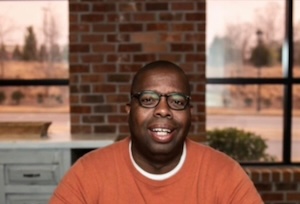Pastor Darren Whitehead Says Digital Fasting Was Life-Changing for His Family

When Dr. Darren Whitehead started Church of the City in 2013, the culture was different when it came to technology, and how the culture even responded to it was different. Whitehead believes that over the last few years, people have begun to mindlessly use technology to numb their pain. Just like they do by consuming food that’s not good for them. Whitehead has written a new book titled The Digital Fast, where he lays out steps to help people get centered on the things that matter in life. Whitehead is clear in saying that he doesn’t think all technology is bad, nor does he believe that people should throw all of their devices away. In a sit-down interview with Christian Headlines/Crosswalk.com, Whitehead makes the case for why putting technology in its proper place is important in our lives, just like he asked his church to do before releasing the book. Whitehead, who is a father of three, walked through how he is asking his audience to ditch technology for forty days, and he is clear how life-changing it was for him and his family.
ChristianHeadlines.com: Why is fasting important for Christ Followers, and at the same time, why is it so hard to do?
Dr. Darren Whitehead: Fasting is probably the most neglected spiritual practice in our modern world. I think it might be more relevant than it's ever been because we live in a time in history where we don’t know what it's like to be hungry and we don't know what it's like to have any of our appetites left unmet. When we're uncomfortable, we go to the fridge, and we find pleasure in food. We cover up our anxieties and our fears and our shame by the pleasure of food. When you fast, all of a sudden, you notice a whole new degree of self-awareness. And what's interesting is that our digital devices have seeped their way into our lives, and nowadays, we tend to soothe and distract ourselves with not just food but with phones and our social media accounts.
CH: Why did you decide to challenge your church to have a digital fast?
Darren: The whole idea of the digital fast came from wanting to apply what would it look like to have a season where we are putting down our digital technology and deliberately trying to pick up God's word and turn up his voice in our ears and ask him to make us more aware of his presence.
CH: OK, Pastor Darren. Which one did you enjoy the most, the actual writing about doing a digital fast or doing the fast itself?
Darren: Well, I tell you an interesting thing. It starts out quite uncomfortable. When you are doing a digital fast, it eventually turns to delight. I'm basically trying to make a case for why people should do it. I particularly think people should do it in a community at large. Social scientists call our relationship with digital technology a collective action problem. We are a society taking collective action doing something that is widely agreed harmful to our mental health. Depression is up, self-harm, suicide, comparison disorders, all of this kind of stuff, right? But no one wants to not be on social media because they don't want to get left out.
CH: Your church went through the process together, and you recommend in the book that churches should do a digital fast together. Why?
Darren: I didn't know this until our church did it ourselves, but it turns out that a church is a uniquely perfect environment to do something like this because everyone's doing it together. Everyone is entering into a season of stepping back, and we're all doing it at the same time. The digital fast is a 40-day experience that is made up of four 10-day increments. The first 10 days are under the title of detach, we're encouraging people to detach themselves from their phones, and to do that primarily is you need to think about the apps on your smartphone through the lens of distraction or utility. There are apps on your phone that are the ones that draw you into a wormhole of distraction; these are social media, games, web browsing news apps, these are the things that you get sucked in. If you're driving in your car and you pull up at the lights and you've got four seconds to spare, you flip open your phone and you just start scrolling on social media. If you remove all of the apps and you only keep utility apps, it is helpful. Utility apps are things like texting calls, checking the weather, opening your garage door, you know, no one checks their Southwest app. There are certain apps that are not a distraction. They are simply a utility. I’m not suggesting that you smash your phone with a hammer. What I'm saying is, remove anything that is a distraction.
CH: What has happened to you when you have done a digital fast?
Darren: I'll never forget there was this one moment the last time I did a digital fast where my 13-year-old daughter said, Daddy, “I'm about to jump on the trampoline. Can you come watch me?” And at this point, I wasn't carrying around my phone in my pocket anymore at my house. I had it in a drawer, so it wasn't even with me. We walked outside, sunset was just about to start, and it was about 71 degrees, and I had no shoes on. I stepped onto the grass, and I just had this conscious thought of like, the grass feels amazing on my feet, and I could smell the air, I could see the colors in the sky, I could hear and feel the stuff you would've missed. My daughter starts doing flips and saying watch me, daddy watch me, daddy. And I had this thought: this is a better life.
CH: What impact do phones and social media have on Generation Z?
Darren: Social scientist Jonathan Heidt is probably the clearest thinker of anyone that I've heard in this space. He says the iPhone came out in 2007, but in 2012, you know, five years later, it was much more widely adopted. There was no app store when the iPhone first came out. The data really changes among children around 2012. Kids have moved from a play-based childhood to a phone-based childhood. They’ve moved from playing to staring at a screen. Research now is showing the detrimental impact of these devices. There was suspicion for a while, but now it's conclusive, particularly among teenage girls.
CH: God has done some amazing things at Church of the City. What do you attribute that to?
Darren: I am so thankful that I get to live in America. I moved here 26 years ago. I really see the influence of the United States and the opportunity the US has on a global scale. God just uses that to motivate me. I'm so thankful to be here. I'm so thankful that I get to lead a church, and it produces so much joy in me. God has guided me and blessed me in ways that I could never have possibly imagined. I believe that the church is God's redemptive strategy for the world.
CH: What advice do you give to parents who are in the thick of this issue when it comes to their kids?
I want to get into the space of giving guidance to parents of young children on how they interact with digital technology. There are some things that I have done that I would do differently as a parent. Jonathan Height, by the way, says that children should not have a smartphone before high school, shouldn’t have social media before 16, and that there shouldn't be smartphones in schools. As parents, we don't want our child to be left out and we want our child to develop into socially intelligent human beings.
With no other options, you just sort of feel like if my kids are the only ones not on TikTok, and that's the way that they're, uh, communicating with one another, then I guess I'll let my kid be on TikTok. I think what we need to do is we need to have a coordinated effort where parents are saying no. We are deliberately doing some things differently so that when new parents are coming into this space there are other alternatives that parents have.
Related video courtesy of YouTube.com: The Digital Fast, sermon by Darren Whitehead
For more information on The Digitial Fast book by Dr. Darren Whitehead please visit thedigitalfast.com.
Photo credit: ©GettyImages/Farknot_Architect

Originally published February 15, 2024.







